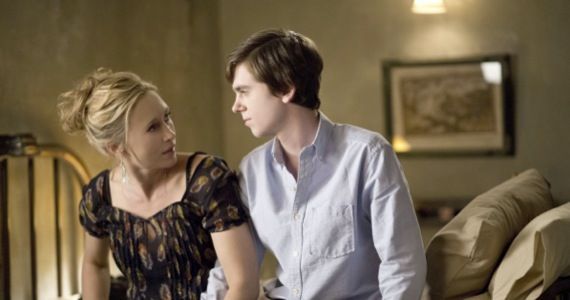The first episode of Bates Motel, "First You Dream, Then You Die", suffers from something of a Norman Bates-esque fractured personality, in terms of how it aims to balance obligations as:
- A predecessor to the events that occur in Psycho, which it foreshadows both visually and thematically.
- The groundwork for a larger neo-Noir story about how idyllic surfaces can only hide away the darkness beneath for so long.
Episode two, "Nice Town You Picked, Norma", tends to be heavy-handed when it comes to the theme of duality - as is spelled out during a scene where Emma (Olivia Cooke) and Norman (Freddie Highmore) discuss William Blake's poem "The Tiger" - but it's also more focused on the idea, suggesting that White Pine Bay's old-fashoned small town appearance is as much a facade as Norman and Norma's outdated fashion sense and "healthy" relationship ("I'm your mother, it's not like it's weird or anything" says Mother Bates in one of the episode's ickiest scenes).
Dylan (Max Thieriot) recognizes all that within a matter of minutes following his unannounced (and unwelcome) arrival at Bates Motel towards the beginning of the episode. Norma's (Vera Farmiga) other son came off as just another abusive man in her life in the Bates Motel premiere - based on their very short and very tense phone conversation - and there's no denying, he fits that description to a degree (labeling his mother as "Whore" on his cellphone).
However, Dylan's present-day rebel without a cause act - complete with a Marlon Brando jacket/motorcycle getup and James Dean's bottled, yet vulnerable, anger - stems from an identifiable place, as he clearly resents being denied a meaningful relationship with his mother (a genuinely healthy one, mind you) and is more than a bit suspicious about how Norma collected on her ex-husband's insurance policy and ran. Dylan is a harmless animal who gives off a more dangerous impression to protect himself, in keeping with the episode's central theme (which is, again, driven home during a scene where Dylan mournfully listens to a Burt Bacharach love tune).
Similarly, we now have a better idea of why fragile Emma immediately recognized a kindred spirit in Norman, even if the idea that she could dismiss a sketchbook depicting women being brutalized - one she found within the mattresses of young Norman's bed no less - as nothing worse than you average hardcore manga is kind of preposterous (and, as far as being an instance of social commentary goes, too heavy-handed).
How far is Emma going to go to accommodate her wannabe boyfriend's interests, before the show's writers decide that it's gotten too ridiculous - even given that she's a lovestruck teenager with an outsider mentality, who is living on borrowed time? "I'm on the list for a transplant but that comes with its own demons," says Emma, which hammers in the idea about her inner recklessness being as much a danger as it is something that allows her to fully enjoy life while she has it.
Norman still only has eyes for Bradley Martin (Nicola Peltz) - the girl he projects disturbing feelings about his mom onto - but Emma is going to be essential to his transformation into a maniac, judging by how she indulges Norman's fascination with the macabre (even when it involves staking out a sex slavery operation) and will encourage his ongoing fascination with death, in ways that go beyond taking up the hobby of taxidermy.
It's no wonder, then, that when Norma first meets her, the conversation so awkwardly shifts to Emma's life expectancy. Mother Bates will be damned if some other woman is going to warp her son's mind, just like Norman is uncomfortable with another man getting to ogle his mother (instead of him) - even if the person in question is Deputy Zach Shelby (Mike Vogel), a fellow who can help ensure that Keith Summers' corpse remains sunk at the bottom of the bay.
The subplot about Norma and Deputy Zach sorta enjoying a night out at the annual Woodchuck Festival serves a purpose beyond further moving the overarching story forward (and continuing to hint that Zach's handsome exterior hides some dark secrets). It's here that we get the clearest idea yet of why the show takes place in a contemporary setting, as the idea of a corrupted town desperate to hold onto its past image as the American ideal is addressed directly; not to mention, serves as a metaphorical reflection of Norman's psychological state.
The question is: as the series progresses forward - and continues to explore more than just the immediate foundation of Norman's madness - can it avoid coming apart at the seams, like the Bates family does in the end? Its main challenge now is to branch out beyond the basic neo-Noir theme about how beauty often hides away the beast lurking within, since that idea has been (to a degree) pounded into our brains after the first two episodes.
-
Stray Observations:
- The way Norma is described as taking the money and running after her husband's mysterious death feels like a more carefully-interwoven allusion to what led Marion Crane to her doom in Psycho.
- Norma, like Marion, also really needs to work on her lying skills.
- Are we going to learn more about why, exactly, Bradley's dad was nearly burned to death? Or was the implied act of retribution near the episode's end the conclusion to that subplot?
- "You know what's peculiar? A 17 year old boy using the word peculiar." Credit goes to Kerry Ehrin, who scripted the many zingers featured in this episode.
------
Bates Motel continues next Monday with "What's Wrong with Norman" @10/9c on A&E. Check out a preview of the episode below:



